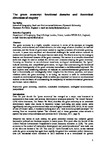The Green Economy: Functional Domains and Theoretical Directions of Enquiry
| dc.contributor.author | Bailey, Ian | |
| dc.contributor.author | Caprotti, F | |
| dc.date.accessioned | 2016-04-12T12:26:02Z | |
| dc.date.accessioned | 2016-04-12T12:40:16Z | |
| dc.date.available | 2016-04-12T12:26:02Z | |
| dc.date.available | 2016-04-12T12:40:16Z | |
| dc.date.issued | 2014-08 | |
| dc.identifier.issn | 0308-518X | |
| dc.identifier.issn | 1472-3409 | |
| dc.identifier.uri | http://hdl.handle.net/10026.1/4488 | |
| dc.description.abstract |
<jats:p>The green economy is a highly complex construct in terms of its attempts to integrate economic, environmental, and social concerns, the wide range of actors involved, its material outcomes, and the forms of governance needed to regulate processes of economic greening. As such, it poses new empirical and theoretical challenges for social science research on socioenvironmental futures. This paper has two main aims. The first is to survey the emergent features and functional domains of the green economy. The second is to consider theoretical tools that might be used to analyse the drivers and processes shaping the green economy. Focusing on literature on sociotechnical transitions, ecological modernisation, the ‘green’ cultural economy, and postpolitical governance, we argue that understanding the functional and spatial heterogeneity of the green economy necessitates a multitheoretical approach. We then explore how combining branches of research on socioenvironmental governance can lead to theoretically and ontologically richer insights into the drivers, practices, and power relations within the green economy. In so doing, we respond to calls for socioeconomic research on environmental change which is neither just empirical nor bound to one theoretical outlook to the detriment of understanding the complexity of socioenvironmental governance and human–nature relations.</jats:p> | |
| dc.format.extent | 1797-1813 | |
| dc.language | en | |
| dc.language.iso | en | |
| dc.publisher | SAGE Publications | |
| dc.relation.replaces | http://hdl.handle.net/10026.1/4486 | |
| dc.relation.replaces | 10026.1/4486 | |
| dc.subject | green economy | |
| dc.subject | transition | |
| dc.subject | sustainable development | |
| dc.subject | ecological modernisation | |
| dc.subject | postpolitical | |
| dc.title | The Green Economy: Functional Domains and Theoretical Directions of Enquiry | |
| dc.type | journal-article | |
| dc.type | Journal Article | |
| plymouth.author-url | https://www.webofscience.com/api/gateway?GWVersion=2&SrcApp=PARTNER_APP&SrcAuth=LinksAMR&KeyUT=WOS:000345693200004&DestLinkType=FullRecord&DestApp=ALL_WOS&UsrCustomerID=11bb513d99f797142bcfeffcc58ea008 | |
| plymouth.issue | 8 | |
| plymouth.volume | 46 | |
| plymouth.publication-status | Published | |
| plymouth.journal | Environment and Planning A: Economy and Space | |
| dc.identifier.doi | 10.1068/a130102p | |
| plymouth.organisational-group | /Plymouth | |
| plymouth.organisational-group | /Plymouth/Faculty of Science and Engineering | |
| plymouth.organisational-group | /Plymouth/Faculty of Science and Engineering/School of Geography, Earth and Environmental Sciences | |
| plymouth.organisational-group | /Plymouth/REF 2021 Researchers by UoA | |
| plymouth.organisational-group | /Plymouth/REF 2021 Researchers by UoA/UoA14 Geography and Environmental Studies | |
| plymouth.organisational-group | /Plymouth/Users by role | |
| plymouth.organisational-group | /Plymouth/Users by role/Academics | |
| dc.identifier.eissn | 1472-3409 | |
| dc.rights.embargoperiod | Not known | |
| rioxxterms.versionofrecord | 10.1068/a130102p | |
| rioxxterms.licenseref.uri | http://www.rioxx.net/licenses/all-rights-reserved | |
| rioxxterms.type | Journal Article/Review |


